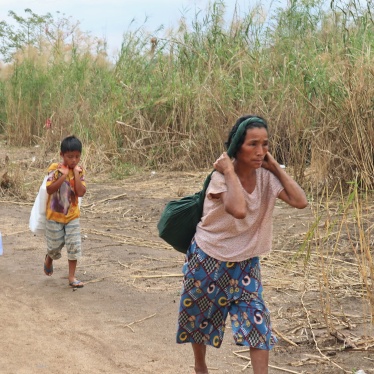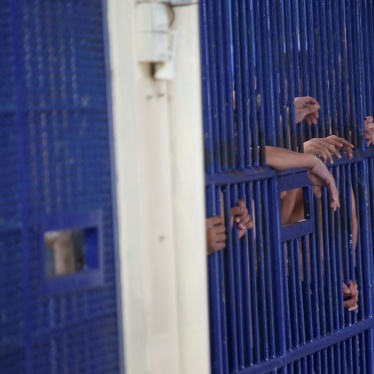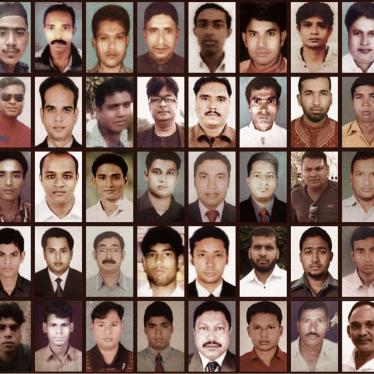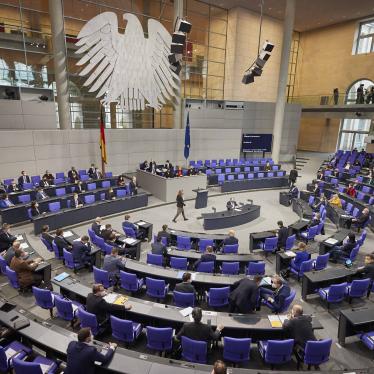(Seoul) – The South Korean government deported two North Korean fishermen on November 7, 2019 to face murder charges in North Korea, where they face likely torture, Human Rights Watch said today.
On November 2, the South Korean navy intercepted a North Korean fishing vessel after a two-day pursuit, and brought the two North Koreans piloting the boat ashore. South Korea’s Unification Ministry said that the government conducted an inter-departmental investigation and determined that the two men, in their 20s, had killed 16 other crew members while squid fishing in the East Sea. After contacting North Korean authorities on November 5, South Korean authorities deported the two men to North Korea on November 7.
“Returning these two men to North Korea was illegal under international law because of the likelihood they’ll be tortured under North Korea’s extremely brutal legal system,” said Phil Robertson, deputy Asia director. “South Korean authorities should have thoroughly investigated the allegations against the two men and ensured they had a full opportunity to contest their being returned to North Korea.”
A Unification Ministry spokesman, Lee Sang-min, said the South Korean government decided to expel the two fishermen because they were “non-political, serious criminals who did not receive protection under the Act on the Protection and Settlement Assistance for Residents Escaping from North Korea (Settlement Act), [and] could pose a threat to the lives and safety of our people if accepted into our society, and as brutal criminals could not be recognized as refugees under international laws.”
The South Korean government has not released detailed information about how it reached these determinations, Human Rights Watch said. The authorities should explain its investigation of the case, the evidence it collected, and whether the suspects had access to legal representation who had the time and opportunity to present their case before an impartial authority. The government should also explain its basis for concluding that the two would not face torture or other ill-treatment if returned to North Korea.
South Korean authorities could have prosecuted the two men for their alleged criminal acts, since under article 3 of the country’s constitution, domestic law extends to the entire Korean peninsula.
While international refugee law excludes from refugee status individuals who committed serious non-political crimes outside the receiving country, human rights law prohibits returning anyone to a country where they would be at substantial risk of being tortured, whether they are a refugee or not.
South Korea is a party to the United Nations Convention against Torture and Other Cruel, Inhuman or Degrading Treatment or Punishment. Article 3 provides that, “No State Party shall expel, return (refouler) or extradite a person to another State where there are substantial grounds for believing that he would be in danger of being subjected to torture.” The UN Human Rights Committee, which monitors state compliance with the International Covenant on Civil and Political Rights (ICCPR), which South Korea has also ratified, stated in a general comment that governments “must not expose individuals to the danger of torture or cruel, inhuman or degrading treatment or punishment upon return to another country by way of their extradition, expulsion or refoulement.”
South Korea’s constitution in article 6 makes international agreements binding law and provides non-citizens with rights under international law. In addition, South Korea’s Refugee Act in article 3 prohibits refoulement of “refugee status applicants,” and article 2(3) provides that a person unrecognized as a refugee may still obtain permission to stay in South Korea on humanitarian grounds if “there are reasonable grounds to believe that his/her life or personal liberty may be egregiously violated by torture or other inhuman treatment or punishment or other circumstances.”
The South Korean government should investigate this incident and hold accountable officials who violated the basic human rights of the two fishermen, Human Rights Watch said. It should take corrective action to ensure that the right not to be returned to torture and other ill-treatment is scrupulously respected in the future.
A 2014 report by the UN Commission of Inquiry found that the North Korean government has committed crimes against humanity against people who were forcibly repatriated, with inhumane acts like torture, murder, imprisonment, deliberate starvation, arbitrary detention, and enforced disappearances. It also found lack of due process in its criminal justice system, in which judges lack independence and impartiality, and there is an effective presumption of guilt, not innocence.
“The South Korean government has violated international law meant to protect everyone from torture worldwide, and put these men at grave risk in North Korea,” Robertson said. “South Korean authorities need to take immediate action to ensure that nothing like this happens again.”







